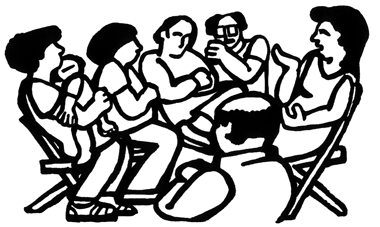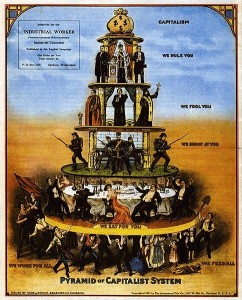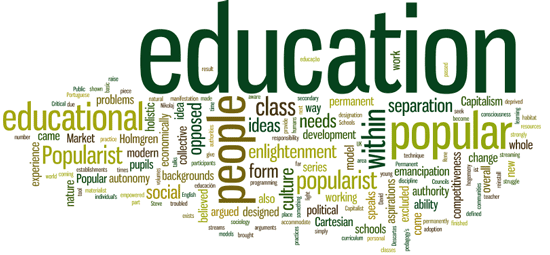How did Popularist education come about?
 Popularist education largely came about as a result of the ethical aspirations and some of the political arguments of the enlightenment. These aspirations and the newly emerging democratic ideal of the time believed that Public education was as a main tool of individual and collective emancipation. It was also believed that this form of education would give people the ability to morally govern themselves through the development of autonomy, this idea came from Emmanuel Kant’s work Was ist Aufklärung (1784) Other influences in the development of popularist education are Rousseau’s On Education (1762) and the some of the work of Nikolaj Grundtvig. Popular education was strongly influenced by both the Positivist and materialist streams of thought that were coming out of the new ideas of the enlightenment. To provide a basic definition, popular education can be defined as an educational technique that is designed to raise the consciousness of its participants and allow them to become more aware of how an individual’s personal experiences are connected to larger societal problems. Participants are empowered to act to effect change on the problems that affect them.
Popularist education largely came about as a result of the ethical aspirations and some of the political arguments of the enlightenment. These aspirations and the newly emerging democratic ideal of the time believed that Public education was as a main tool of individual and collective emancipation. It was also believed that this form of education would give people the ability to morally govern themselves through the development of autonomy, this idea came from Emmanuel Kant’s work Was ist Aufklärung (1784) Other influences in the development of popularist education are Rousseau’s On Education (1762) and the some of the work of Nikolaj Grundtvig. Popular education was strongly influenced by both the Positivist and materialist streams of thought that were coming out of the new ideas of the enlightenment. To provide a basic definition, popular education can be defined as an educational technique that is designed to raise the consciousness of its participants and allow them to become more aware of how an individual’s personal experiences are connected to larger societal problems. Participants are empowered to act to effect change on the problems that affect them.
Popular education is a concept grounded in the notions of social class, political struggle, and social change. The term is a translation from the Spanish educación popular or the Portuguese educação popular and rather than the English usage as when describing a ‘popular television program,’ popular here means ‘of the people.’ More specifically ‘popular’ refers to the ‘popular classes,’ which include peasants, the unemployed, the working class and sometimes the lower-middle class. The designation of ‘popular’
Huge inequality in the modern world as popularist education is colonised by Capitalism
 It could rightly be argued that the modern manifestation of popularist education establishments such as secondary schools is far removed from the emancipatory nature of the ideals of the enlightenment. The practice of streaming and lumping people into groups according to their ability owes more to Capitalist ideas of competitiveness than the collective nature of education as a form of emancipation for working class people.
It could rightly be argued that the modern manifestation of popularist education establishments such as secondary schools is far removed from the emancipatory nature of the ideals of the enlightenment. The practice of streaming and lumping people into groups according to their ability owes more to Capitalist ideas of competitiveness than the collective nature of education as a form of emancipation for working class people.
It could be argued that this competitiveness is really social programming to prepare people for the Market place once they have finished their education, within the discipline of sociology such practices would be an overall part of the hidden curriculum. Similarly, the authority of the teacher as opposed to the overall learning experience prepares people to accept authority. In recent times the high number of pupils who are expelled or permanently excluded from UK Schools speaks volumes about the lack of commitment and responsibility shown to pupils from economically disadvantaged backgrounds; these students are simply excluded, then passed around the various schools that are prepared to accommodate them within their local area. Cash strapped Councils and education authorities do not have the resources nor the flexibility within their pedagogy’s to offer holistic educational solutions for young people from troubled and economically deprived backgrounds. Popularist education has clearly lost its way due to the infiltration and subsequent hegemony of ideas and underpinnings that have come from Capitalism and the needs of the Market as opposed to the needs of people.
Popularist education within the context of a Permanent culture
Of all of the educational models that this series explores the model of popularist education that is currently in operation at the moment is not suited to developing a permanent culture. An educational model that would help to bring about a permanent culture needs to be anti-authoritarian as would seek to reinstall autonomy and it would also have to be cooperative as opposed to competitive so that our job of rebuilding communities can be made easier. Permaculture pioneer David Holmgren speaks of the separation of humans from natural habitat as being something that was brought about by Rene Descartes Cartesian dualism and its adoption, this same separation that Holmgren talks about exists within education, and the way the whole of the educational experience is designed. The next piece in the educational series looks at Critical Multiculturalism, a revolutionary and holistic form of education that challenges the idea of Cartesian separation by looking at education in whole new light.
Steve

